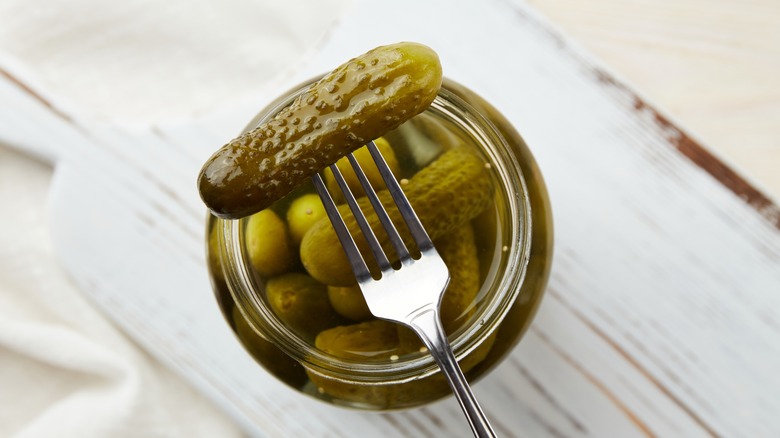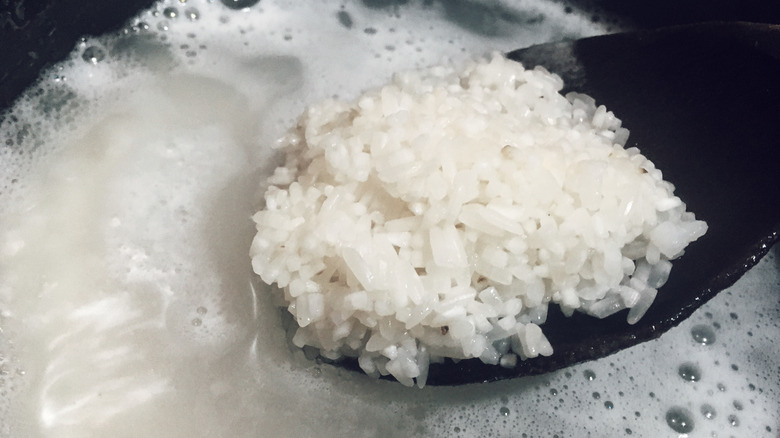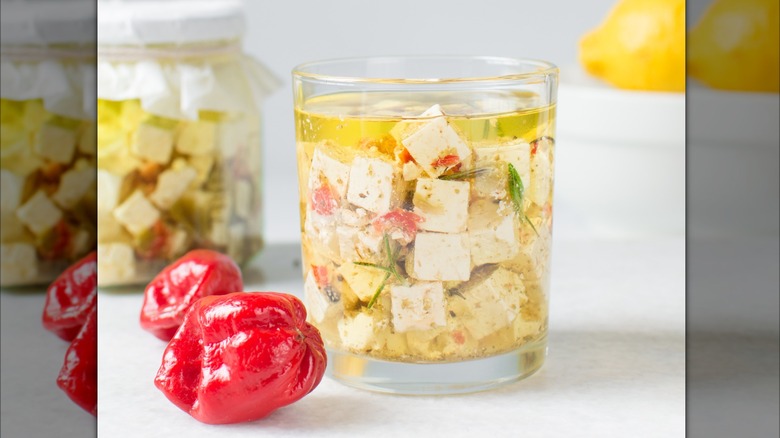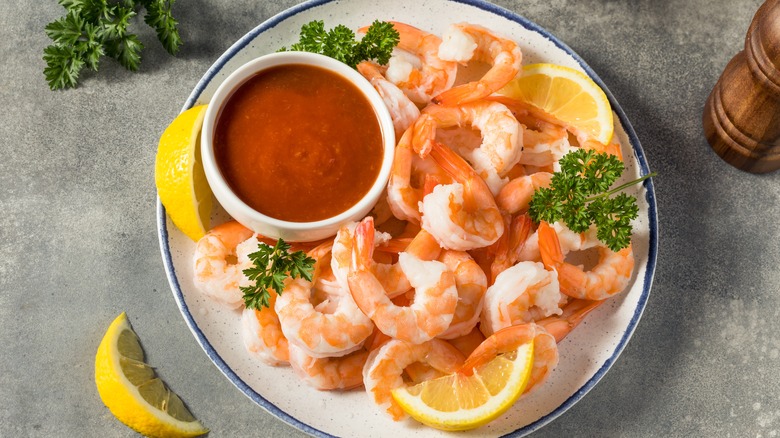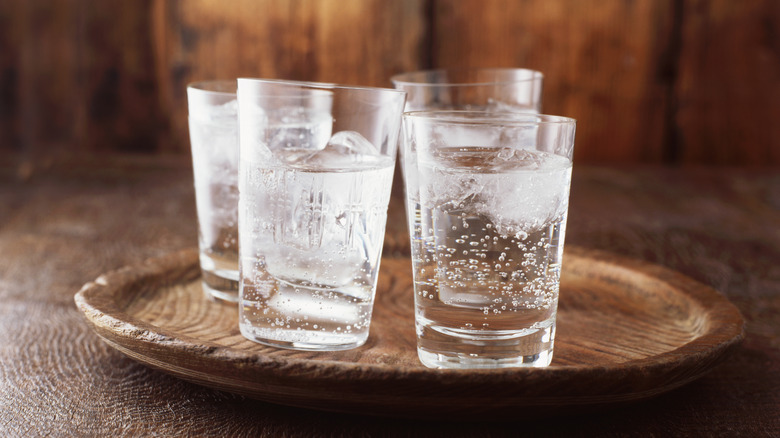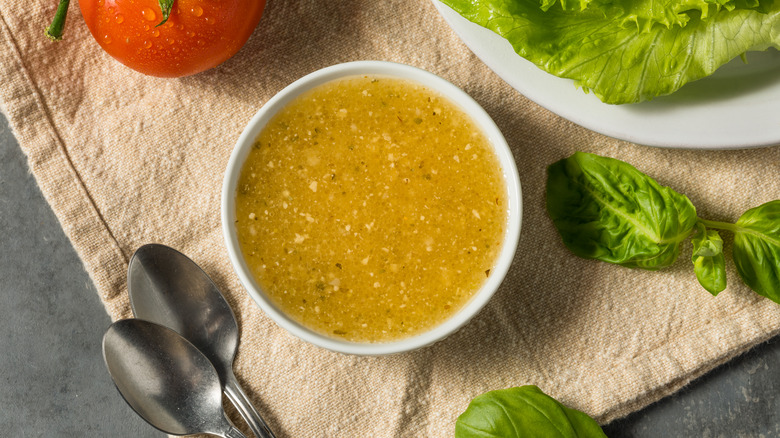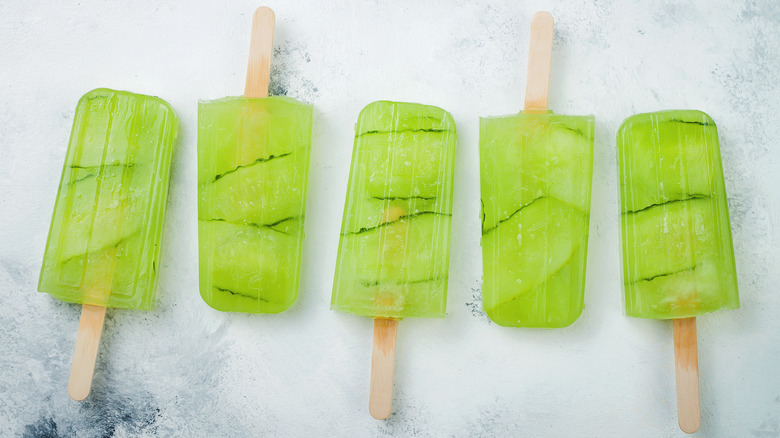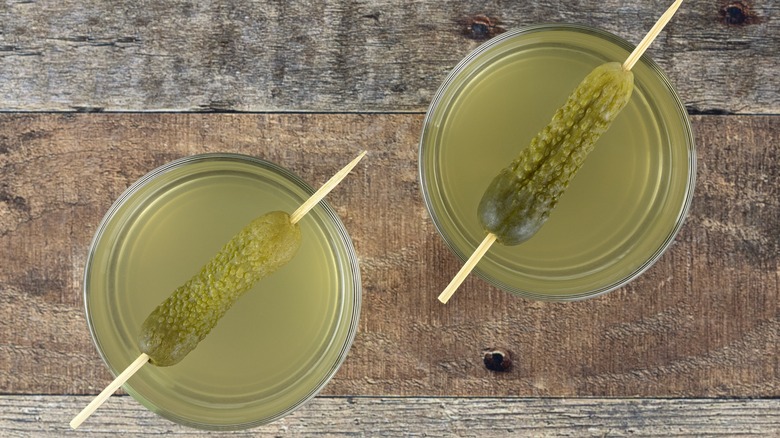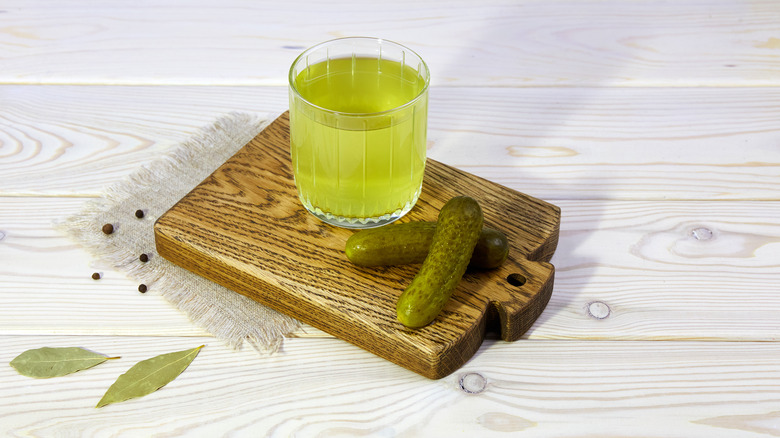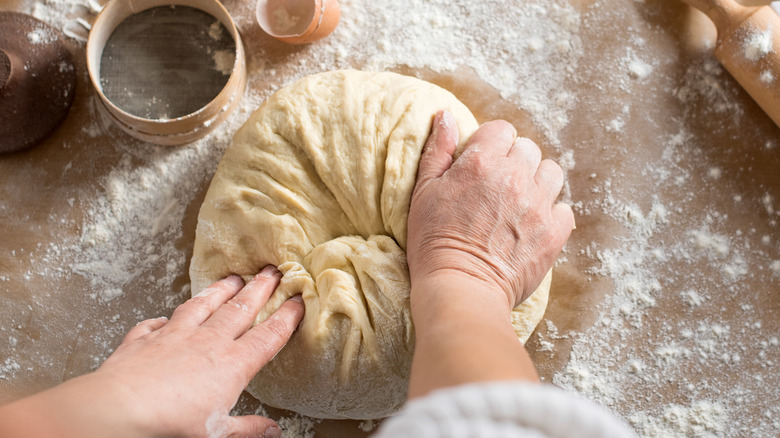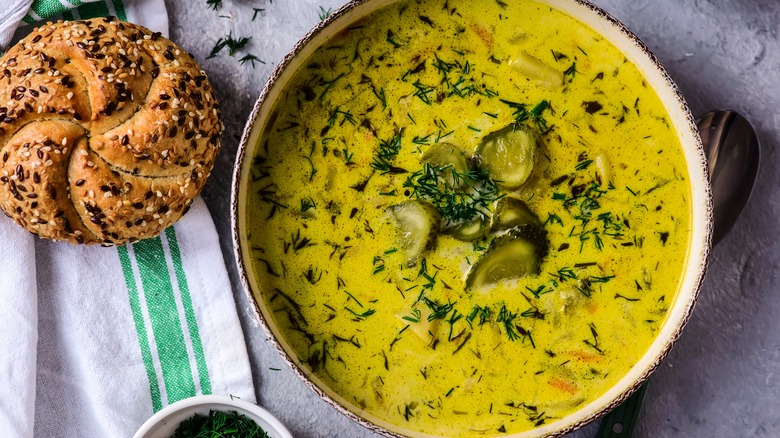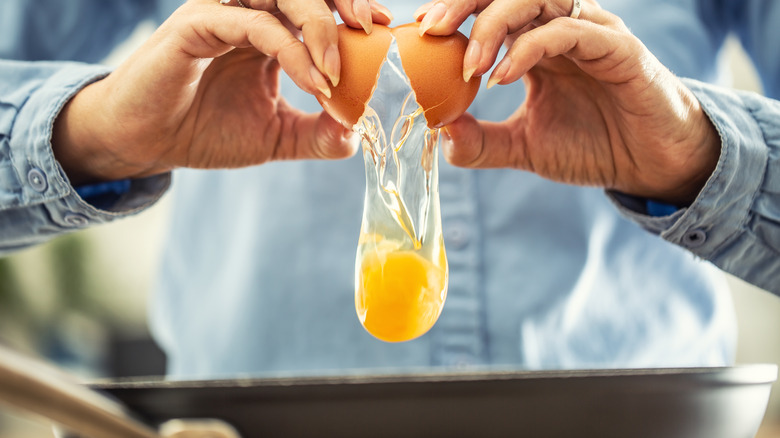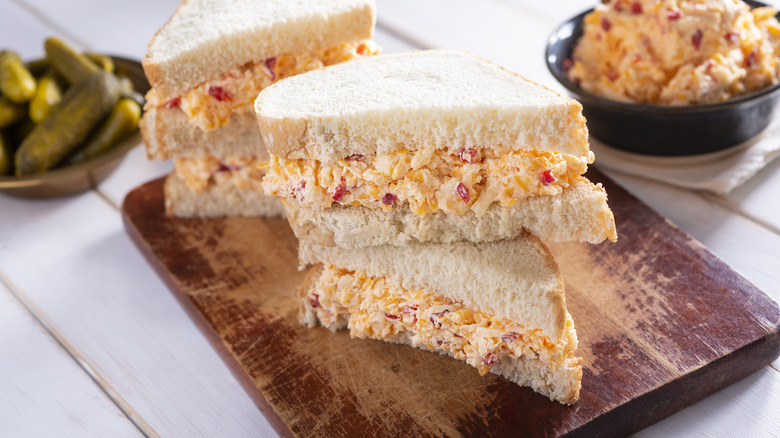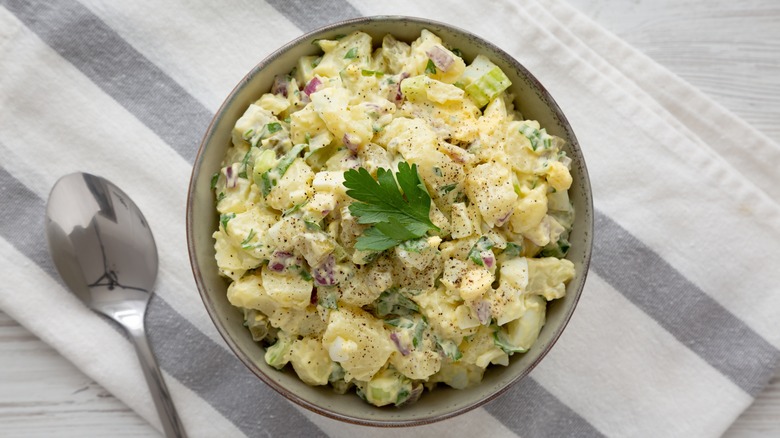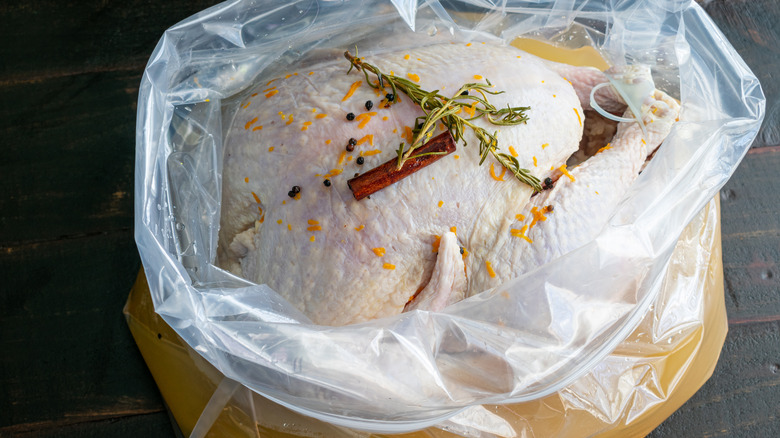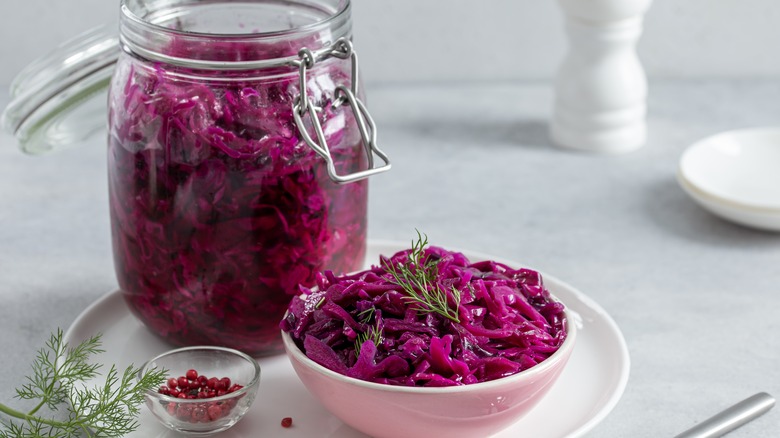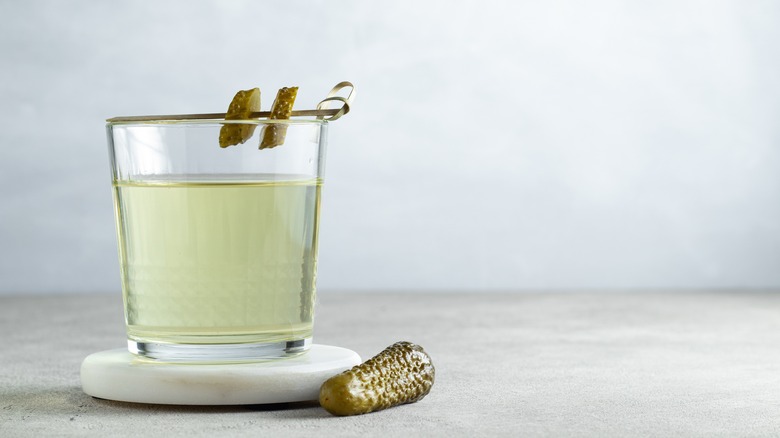17 Clever Uses For Leftover Pickle Juice
So you just polished off a jar of dills. Or maybe gherkins. Or maybe bread and butters. Maybe you're a stalwart Vlasic fan or you love Mt. Olive. Whatever the case may be, whatever your preferred pickle, it's all come down to the same result: You've eaten them all and now you have a jar of pickle juice.
Stop just a moment before you pour it all down the drain without thinking, and then simply recycle the glass jar. There are a lot of ways you can use that leftover pickle juice, whether you're using it to give another food or ingredient a sharp punch of pickle flavor, or you're taking advantage of the juice's vinegar base and repurposing it altogether. Some potential uses for your leftover pickle juice are a little obvious, while others seem to come far from left field, but are actually pretty genius. Here are our favorite, cleverest uses for leftover pickle juice.
Cook some rice
If you've cooked your fair share of rice, then you know that simply cooking rice in water — no matter your preferred rice-cooking method — is a recipe for a bland and boring pot of rice. Unless you plan on incorporating that rice into a much more flavorful dish, you need to switch out the water for something more interesting, like broth, or you need to flavor the water and/or rice with some ingredients that provide a more distinctive flavor profile. So what about pickle juice?
Replace about a third of your cooking water with pickle juice. This will make for a cooking liquid that harnesses the saltiness of your pickle brine, as well as other flavors, depending on if there's additional herbs, spices or garlic in your chosen pickle juice. Don't add any extra salt to your cooking liquid, as the brine will take care of that on its own. Otherwise, cook your rice like normal.
Marinate some cheese
Marinated, soft cheeses make for a delicious appetizer, snack, or addition to a charcuterie board or antipasto platter, and, as it so happens, marinating cheese is pretty easy, even if the results are a little fancy. You can use your pickle juice to give the soft cheeses of your choice a zippy, tangy flavor profile.
While some marinated cheeses are only marinated in olive oil, other recipes bring in vinegar as well, and that's where your pickle juice comes in. Use it in place of vinegar, so you get not only the vinegar tang, but also the flavors of your pickles past. All you'll need to do is choose a cheese — milder, semi-firm cheeses are a good choice — and a flavor profile. Beyond your olive oil and pickle juice, consider adding other ingredients such as herbs, seasonings, or accompaniments like pimentos, garlic, or green onions. Once you've decided on your combo, mix your marinade and pour it over your cheese, in a serving dish or in an empty jar (maybe your newly empty pickle jar). Refrigerate until you're ready to serve.
Make shrimp cocktail
Pickle juice can add a bright, savory-sour flavor to a shrimp cocktail. You have two options here: You can either choose to brine the shrimp in the leftover pickle juice, to infuse the flavors into milder shrimp, or you can add a little to your cocktail sauce. If you opt to add the pickle juice to your shrimp cocktail sauce, only add just a splash at first, then give the sauce a taste, and adjust from there.
Additionally, choose the leftover pickle juice that you add to your shrimp cocktail with care. If you're making a classic shrimp cocktail, a pickle juice from a variety like dill or bread and butter is a good choice, as both the dill in the former and the sugar in the latter will work well with the acidity of a classic shrimp cocktail. If, though, you're making something like a Mexican-inspired shrimp cocktail recipe or a zesty cocktail sauce with horseradish, then you might opt for a pickle juice that has some heat.
Splash pickle juice in sparkling water
It's not as strange as it sounds! Whole Foods carries a pickle-flavored sparkling water described as "fun," "tangy," and "curiously tasty." Redditors have created a pickle juice-inspired mocktail by blending pickle juice, sparkling mineral water, and lemon. Anecdotal reports even say that Disneyland offered a somewhat similar concoction earlier this year, mixing pickle juice with lemonade and Sprite, for a "sparkling pickle lemonade."
So, if you want to see what all the hype is about, just add a shot or two to your next glass of sparkling water. Better yet, freeze the pickle brine into ice cubes and then add those to your bubbly beverage. You can even give this drink an adult twist by using your pickle brine or ice cubes in a classic ranch water; it's a cocktail that's typically just tequila and sparkling water with lime, but now, thanks to your pickle juice, will have a zesty tang.
Blend a salad dressing
What is the base of a vinaigrette? It's all in the name: vinegar. What's pickle brine? It's majority vinegar. So, if you're looking to make a zingy vinaigrette for your next salad, but you're all out of neutral acid (or looking to use a leftover jar of pickle juice), reach for your brine.
A pickle juice vinaigrette comes together just like any other simple vinaigrette — with oil, your pickle juice, and the herbs, spices, and other ingredients of your choice: garlic, shallots, or red pepper flakes. Do you have a more sugary jar of pickle juice to use up? Make a sweet pickle salad dressing by combining sweet gherkin pickle juice with Miracle Whip, milk, salt, and pepper.
You can also just wing it, without emulsifying your oil and pickle juice into a proper vinaigrette. There's nothing wrong with tossing your salad with a bit of olive oil and some pickle juice to taste, and then sprinkling on your seasonings.
Make popsicles
This is one way to use your leftover pickle juice that really is just for the diehard pickle fans out there. If you're constantly trying the new pickle-flavored products on the market, this is a hack that'll leave all your less-than-pickle-enthusiastic friends scratching their noggins.
To make pickle popsicles, all you have to do is strain your leftover pickle juice to remove any non-liquid remnants and then pour that pickle juice into a popsicle mold and freeze. That's it. Of course, if you want to experiment and craft some unique flavor profiles, there are other options as well. Add other liquid ingredients like hot sauce or ground spices like pepper or garlic powder. You can also add your favorite spirit for a boozy adult popsicle. Yes, while alcohol won't freeze on its own, if you mix it with another ingredient with a higher freezing temperature (like pickle juice), it will freeze into popsicle form just fine.
Mix some cocktails with leftover pickle juice
Along the lines of adult-centric uses for your leftover pickle juice, one of the easiest ways to use up that pickle juice, fast, is by mixing up a batch of cocktails. Some cocktails seem to be simply meant for pickle juice, such as a dirty martini, which already incorporates olive juice (and pickle juice isn't that far off). There's also the cocktail-adjacent libation known as the Pickle Back, where drinkers take a shot of bourbon or another whiskey and then follow it up with a shot of pickle juice. However, there are more interesting and unexpected options.
For example, consider making a pickle juice whiskey sour, which requires you to make a sweet-leaning pickle juice syrup using bread and butter pickle juice and sugar, before mixing the syrup with lemon juice, bourbon, and an egg white. Or, make what's known as The Fisherman's Folly, a salty cocktail that also incorporates fish sauce, along with gin and sake.
Blend it into a dip
You could make a creamy dip using pickle juice...or you could just use the pickle juice on its own, as a dip all by itself. It's an interesting option that was presented to Mashed in an exclusive interview with food blogger and cookbook author Siri Daly.
Daly told Mashed that, as a child, one of her favorite snack combos was Old Dutch potato chips and pickle juice. She'd dip the potato chips in the pickle juice, she said, long before you could just buy a bag of dill pickle-flavored chips at the grocery store. So, if you're craving pickle potato chips and aren't in the mood to run to the store to fulfill that craving, take a page out of Daly's book and just pop open that jar of pickle juice and begin dipping away.
If, though, you're looking for a project, you can make dill pickle-flavored potato chips at home. Just make homemade potato chips like you might normally, but marinate your potato slices in pickle juice for at least an hour before cooking.
Make some bread
Whether you're a long-time baker, hopped on the sourdough bandwagon mid-pandemic, or are a complete novice looking to get your hands covered in flour for the first time, consider making your next loaf of bread using your leftover pickle juice. Pickle juice bread is briny and tangy, and pretty easy to make.
A basic pickle juice bread recipe simply asks you to heat your leftover pickle juice to 110 degrees Fahrenheit, and then use that warmed juice to activate your dry yeast, as you might normally with warm water, when making a loaf of yeasted bread. Then, you'll make your loaf as normal (though you do have the option to add some chopped dill pickles to the loaf, for extra flavor and texture).
Adding pickle juice to an existing bread recipe is an especially good idea if you're making a bread that traditionally goes with sharper, more acidic flavors; think a loaf of rye, which you can use to make a sandwich piled high with sauerkraut, pickles, and corned beef.
Whisk leftover pickle juice into your soup
If you like soups that tend to lean a little sour, such as hot and sour soup or a traditional borscht, then you're going to love adding pickle juice to your soup. It's a quick and easy way to add a bit of tang to more basic soups that could use a little livening up. Consider a matzah ball soup or simple chicken-and-veg soup. Go slow at first, though; you don't want to add too much pickle soup and end up with a broth that's mostly vinegar. Try replacing about an eighth of your broth with pickle juice, to start.
Love this concept and want to take the pickle-and-soup combo even further? Make a batch of zupa ogórkowa, or Polish dill pickle soup, which blends potatoes and pickles in a creamy chicken and pickle juice broth. It's the perfect thing to serve alongside your pickle juice-infused rye bread.
Fry some eggs
You may have seen TikTok creators frying eggs in pickle juice and, if you've been intrigued but never given it a try, this is your sign to do so. All you have to do to make pickle brine-infused fried eggs is to fry your eggs like normal, but then, when they're almost done, add the brine to the pan and swirl it around so that the brine fully covers and coats each egg. Continue cooking until the eggs reach your desired doneness.
Of course, if fried isn't your go-to egg prep method, you can also add pickle juice to other egg cooking techniques. For example, vinegar is a key ingredient in most poached eggs recipes, as the acid helps the poached egg retain its shape as it cooks; you could feasibly replace this vinegar with pickle juice. You can also make some easy pickled eggs by putting peeled, hard-boiled eggs in leftover pickle juice, and letting them sit in the fridge for at least three days.
Make pimento cheese
Pimento cheese is a Southern staple. If you've never had it, it's a very creamy spread that's mostly mayo, cream cheese, and cheddar cheese, along with the namesake pimentos. To add extra flavor, garlic powder and Worcestershire sauce are added in, and then, in some pimento cheese recipes, a dash of pickle juice, for extra zing.
Pimento cheese comes together in mere minutes (less if you don't grate your own cheddar cheese at home — though this decision will be frowned upon by any true Southerner in your midst) and is best enjoyed after it's had a day to sit in the fridge, allowing all the flavors to meld. From there, the classic way to eat it is between two slices of white bread, but you can also use it as a dip, mix it into your macaroni and cheese, add it to your eggs, or put it on a burger. Wherever you might use a creamy cheese, pimento cheese fits in.
Add it to your potato salad
Some potato salad recipes call for adding diced pickles or sweet pickle relish, but if you want even more pickle flavor in your potato salad, pour some brine straight from the jar. It makes for a salty, acidic, tangy flavor that's not overly pickle-y, so even the people at your picnic who aren't fans of all things pickle will enjoy it. Start by adding about a third of a cup of pickle juice to your potato salad and then increase the amount from there, if you decide you'd like a more intense flavor. Additionally, if you normally use vinegar in your potato salad, consider leaving it out if you'll be adding brine.
While dill pickle juice is a no-brainer option here, you can also use the juice from bread-and-butter pickles or sweet gherkins for a sweeter flavor profile. Likewise, use hot pickle juice for a more pronounced kick of flavor.
Brine your chicken with pickle juice
The terms "pickle juice" and "pickle brine" are often used interchangeably, so it's just a given that this brine could work in other situations wherein you might also use a traditional brine made of water, salt, and seasonings, to tenderize, moisturize, and add flavor to meat. Pickle juice brines are a favorite particularly for poultry, including chicken and turkey.
Think about it. Fried chicken often is brined in buttermilk, which has a characteristic sour tang; adding pickle juice to the mix can only make things better. Serve your pickle juice-brined fried chicken with an equally tangy slaw and between two buns made with pickle juice and you have a match made in pickle heaven. Do note, though, that if you brine your Thanksgiving turkey in pickle juice, it may have a slight pickle flavor and aroma. Cut that pickle-y flavor in half and go with a slightly spicier take, with Carla Hall's spicy pickle habanero brine.
Pickle other ingredients
Pickling at home might sound difficult or intimidating to those who haven't tried it, but it's actually quite easy. Quick pickling simply requires boiling water, vinegar, and seasonings, and then pouring the liquid over whatever you hope to pickle, and letting it sit. You can quick pickle just about any vegetable or fruit, too, so it's a great option if you have a lot of excess summer produce.
You can make this easy process even easier by using your leftover pickle juice to quick pickle your other ingredients. Just heat up your leftover pickle juice, add some extra salt, and then pour the juice over the ingredients you want to pickle, in a jar, and then seal it and let it sit in the fridge. After the pickled ingredients have cooled, eat them within a week. If you want a less pungent flavor and are sure you'll eat your pickled ingredients within three days, you can skip the heating process.
Treat sunburn with pickle juice
And you thought that you could only repurpose your leftover pickle juice in ways that required you to pull other ingredients from your pantry! Pickle juice can also become part of your home remedy arsenal, particularly when it comes to treating a sunburn. This is a bit of a folksy remedy, so take it with a grain of salt, but the idea is that, if you have a sunburn, you can apply the pickle juice to your skin, either directly or via a cloth or paper towel, for pain relief.
The vinegar content is supposedly to credit for pickle juice's sunburn-relieving properties, as vinegar is also a circulated home remedy to treat sunburns, but proceed with caution. Some say that vinegar (and thus pickle juice) combined with cold water in the bathtub can relieve sunburn pain, while others say the acidic content make a sunburn worse. If you do want to try this remedy, test a small patch of skin, and only on a very mild sunburn.
Drink it for extra hydration
Along these lines, if you've been out in the sun for a while and need to recover (or maybe you enjoyed too many pickle-infused cocktails last night), pickle juice can give you a quick hydration boost. Pickle juice contains electrolytes like potassium and sodium, and the vinegar content can even help prevent dehydration-related muscle cramps. So, no Gatorade on hand? Reach for the pickle jar.
However, Cleveland Clinic does say to go easy on the pickle juice if you're watching your sodium intake. While the sodium is a valuable electrolyte, it is possible to have too much of a good thing. Additionally, Cleveland Clinic recommended drinking a pickle juice that does not contain preservatives or food dyes. As you rehydrate, you'll also enjoy pickle juices' other health benefits, including gut-healthy probiotics, the vinegar's ability to help regulate blood sugar, and antioxidants, vitamins, and minerals that have seeped into the pickle juice from the pickles.
